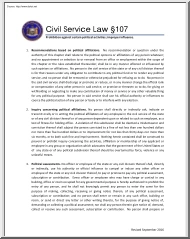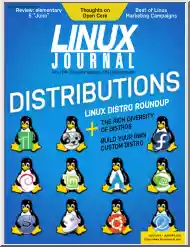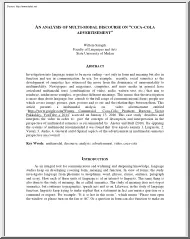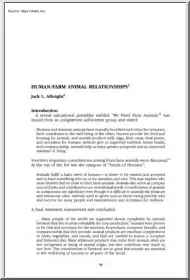Please log in to read this in our online viewer!
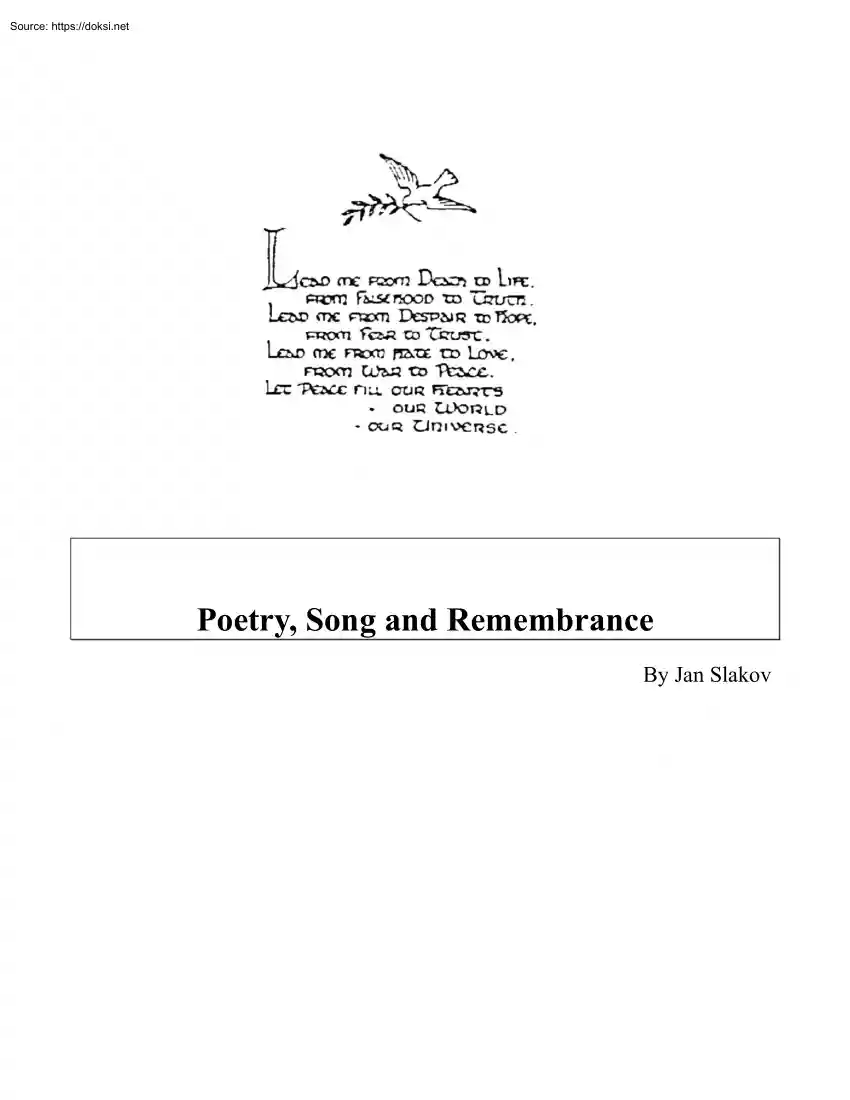
Please log in to read this in our online viewer!
No comments yet. You can be the first!
What did others read after this?
Content extract
Poetry, Song and Remembrance By Jan Slakov Introduction This section contains poems with some commentary which can be used in Language Arts lessons around Remembrance Day. You can find more poems on the theme of war in the Teachers' Guide prepared by the Royal Canadian Legion and sent to each school in Canada and on the Peace Pledge Union website: <http://www.whitepoppyorg> * LINKS to peace songs on You Tube: À NOTER : Les quatre premiers liens ont du contenu en français. Charlotte Diamond singing “May There Always Be Sunshine” ( but the visuals are strange): http://www.youtubecom/watch?v=8R9p Ua67Vk Raffi “May There Always Be Sunshine”: http://www.youtubecom/watch?v=bq3vzB2H0yI Boris Vian, Le déserteur: http://www.youtubecom/watch?v=gjndTXyk3mw Petits chanteurs de Nancy - “Plus jamais la guerre” http://www.youtubecom/watch?v=eqe kA2rij4 Seeger singing: Last Night I had the Strangest Dream: http://www.youtubecom/watch?v=AZU-9TBP2NY Joan Baez singing
“Where have all the Flowers Gone?” at a national event honouring Pete Seeger. In 1963 Joan Baez refused to appear on ABC-TV's Hootenanny show because it had banned Pete Seeger as a result of his political activism : http://www.youtubecom/watch?v=Lz eJqQCCig “Bring 'em Home” performed by Pete Seeger, Billy Bragg, Ani DiFranco, Steve Earle w. great visuals http://www.youtubecom/watch?v=odNkadXgID8 Pete Seeger singing “Where have all the Flowers Gone?” (great visuals): http://www.youtubecom/watch?v=1y2SIIeqy34 2 vidoes of John McCutcheon singing “Christmas in the Trenches”: http://www.youtubecom/watch?v=sJi41RWaTCs This one has historical photos to accompany the song: http://www.youtubecom/watch?v=QTXhZ4uR6rs&feature=related In Flanders Fields by John McCrae In Flanders fields the poppies blow Between the crosses, row on row That mark our place; and in the sky The larks, still bravely singing, fly Scarce heard amid the guns below. We are the Dead. Short
days ago We lived, felt dawn, saw sunset glow, Loved and were loved, and now we lie In Flanders fields. Take up our quarrel with the foe: To you from failing hands we throw The torch; be yours to hold it high. If ye break faith with us who die We shall not sleep, though poppies grow In Flanders fields. This poem and others are available on the Peace Pledge Union web site <http://www.whitepoppyorg>1 Below is some information about "In Flanders Fields" from that site. 1 Note 1 : P E A C E P L E D G E U N I O N 1 Peace Passage London N7 0BT, Britain. phone +44 (0)20 7424 9444 fax: +44 (0)20 7482 6390 John McCrae's commanding officer records that 'this poem was born of fire and blood during the hottest phase of the second battle of Ypres'. This battle began on April 22 1915 and lasted 17 days Total casualties have been estimated at 100,000 on either side. Half the Canadian brigade to which John McCrae was attached were killed. Shortly afterwards a
profoundly weary McCrae was posted away from the front line, to a hospital in Boulogne. Friends were worried by the change in him He worked at the hospital until January 1918, and was about to take up a post with the British army. But he fell ill with double pneumonia and meningitis, and died on January 28. He is buried in the cemetery at Wimereux. 'In Flanders Fields' was published in the magazine Punch, where it was seen as an invitation to recruits, in December 1915. One of the many readers moved by it was Moina Michael, the American War Secretary of the YMCA (Young Men's Christian Association). She suggested that American exservicemen adopt the poppy as their emblem, and started plans for artificial poppies to be made It was later suggested to the British Legion that it should sell artificial poppies to raise funds for British exservicemen, and the first Poppy Day was held on November 11 1921. John McCrae's poem has been associated with the BL's annual
Poppy Appeal ever since. In Canada, the poppy was adopted as a symbol by the Great War Veterans Association in that same year. When the Royal Canadian Legion was established, in 1925, it carried on the tradition. According to the site: "Nowadays the last stanza is often left out, because of its belligerence." However, accoding to Richard J. Doyle, former editor of the Globe and Mail, McCrae had the opposite of belligerence in mind when he wrote that stanza: “The words that are not often recalled when McCrae is remembered are his comment to a Canadian chaplain that the "foe" mentioned in the line "take up our quarrel with the foe" was not intended to be the German or Austrian soldier; it was the spirit of warfare. Allied soldiers had been assured this was a war to end war. The torch was the will to realize this ideal “ When One Person Reaches Out With Love by Yevgeny Yevtushenko Yevgeny Yevtushenko, one of the most loved Russian poets, wrote this
prose poem, about a transforming moment which he witnessed. This was in 1944 when he was with his mother travelling from Siberia to Moscow, and they saw a procession of twenty thousand German war prisoners marching through the streets of Moscow. The pavements swarmed with onlookers, cordoned off by soldiers and police. The crowd was mostly women - Russian women with hands roughened by hard work, lips untouched by lipstick and with thin, hunched shoulders which had borne half the burden of the war. Every one of them must have had a father or a husband, a brother or a son killed by the Germans. They gazed with hatred in the direction from which the column was to appear. At last we saw it. The generals marched at the head, massive chins stuck out, lips folded disdainfully, their whole demeanor meant to show superiority over their plebian victors. "They smell of eau-de-cologne, the bastards", someone in the crowd said with hatred. The women were clenching their fists. The
soldiers and policemen had all they could do to keep them back. All at once, something happened to them. They saw German soldiers, thin, unshaven, wearing dirty, bloodstained bandages, hobbling on crutches or leaning on the shoulders of their comrades; the soldiers walked with their heads down. The street became dead silent - the only sound was the shuffling of boots and the thumping of crutches. Then I saw an elderly woman in broken-down boots push herself forward and touch a policeman's shoulder, saying: 'Let me through'. There must have been something about her that made them step aside. She went up to the column, took from inside her coat something wrapped in a coloured handkerchief and unfolded it. It was a crust of black bread She pushed it awkwardly into the pocket of a soldier, so exhausted that he was tottering on his feet. And now suddenly from every side women were running towards the soldiers, pushing into their hands bread, cigarettes, whatever they had. The
soldiers were no longer enemies. They were people. >From A Precocious Autobiography by Yevgeny Yevtushenko, pp. 24-25, translated by Andrew R MacAndrew. Translation copyright c) 1963 by Yevgeny Yevtushenko, renewed 1991 by Yevgeny Yevtushenko. Translation copyright c) 1963 by EP Dutton, renewed 1991 by Penguin USA Used by permission of Dutton Signet, a division of Penguin Books USA, Inc. Published in the July/August 1995 issue of Fellowship magazine: www.forusaorg, Box 271, Nyack NY 10960 For a sample copy and/ or the Cards/Book catalog, write Bookstore@forusa.org * A Grade Six student wrote about his experience writing a poem on the topic of peace: Peace means different things to many people. Some may never experience it, and yet a few may never realize it was with them all along. When our English teacher gave us our assignment of writing a poem, she focused our young minds to see similarities in the world, and compare them to each other. With this wonderful new tool, I saw
things I had never noticed before, even taken for granted. I felt a new understanding of peace, and realized right away that it would come and go, sometimes stronger, sometimes weaker, just like the wind. Michael Dragland Peace is Like the Wind The important thing about peace Is that it is like the wind. You can't see it but you can feel it. It has an impact on what you do. It is made of love and joy It is made of all the brilliant colours of the world. It is rich, yet even the poor may have it. It can also come and go But the important thing about peace Is that it is like the wind. MY GRANSON'S QUESTION by R. H Young (when the Gulf War started) My grandson Daniel wisely asked, Of life before my war, What seeds of violence had been cast, The months and years before. 'Twas hurt and hate and hopelessness, The winner-loser game And military businesses, To keep the world the same. No person dare to speak against, The country's status quo, If protest was experienced,
"They're not like us, you know!" Beware unwillingness to change, To want a better world's not strange. You Asked Me by Jan Slakov You asked me would I die for my country Let me tell you, I wouldn't do it lightly For my life is precious beyond measure And my country has borders of convenience To make money, to keep out. You never asked me if I'd kill for my country Let me tell you, I wouldn't do it lightly For their lives are precious beyond measure And their fate is bound up in our own. Killing them we license our own death. Christmas in the Trenches by John McCutcheon My name is Francis Tolliver, I come from Liverpool. Two years ago the war was waiting for me after school. To Belgium and to Flanders, to Germany to here I fought for King and country I love dear. 'Twas Christmas in the trenches, where the frost so bitter hung, The frozen fields of France were still, no Christmas song was sung Our families back in England were toasting us that
day Their brave and glorious lads so far away. I was lying with me messmate on the cold and rocky ground When across the lines of battle came a most peculiar sound Says I, "Now listen up, me boys!" each soldier strained to hear As one young German voice sang out so clear. "He's singing bloody well, you know!" my partner says to me Soon, one by one, each German voice joined in harmony The cannons rested silent, the gas clouds rolled no more As Christmas brought us respite from the war As soon as they were finished and a reverent pause was spent "God Rest Ye Merry, Gentlemen" struck up some lads from Kent The next they sang was "Stille Nacht". "'Tis 'Silent Night'", says I And in two tongues one song filled up that sky "There's someone coming toward us!" the front line sentry cried All sights were fixed on one lone figure trudging from their side His truce flag, like a Christmas star, shone on that plain
so bright As he, bravely, strode unarmed into the night Soon one by one on either side walked into No Man's Land With neither gun nor bayonet we met there hand to hand We shared some secret brandy and we wished each other well And in a flare-lit soccer game we gave 'em hell We traded chocolates, cigarettes, and photographs from home These sons and fathers far away from families of their own Young Sanders played his squeezebox and they had a violin This curious and unlikely band of men Soon daylight stole upon us and France was France once more With sad farewells we each prepared to settle back to war But the question haunted every heart that lived that wondrous night "Whose family have I fixed within my sights?" 'Twas Christmas in the trenches where the frost, so bitter hung The frozen fields of France were warmed as songs of peace were sung For the walls they'd kept between us to exact the work of war Had been crumbled and were gone forevermore My name is
Francis Tolliver, in Liverpool I dwell Each Christmas come since World War I, I've learned its lessons well That the ones who call the shots won't be among the dead and lame And on each end of the rifle we're the same John McCutcheon's web site <http://www.folkmusiccom> is a great resource for teachers interested in peace education. It features teaching ideas from Colman McCarthy (author of I'd Rather Teach Peace and director of the Center for Teaching Peace) and some of John's writing, such as the example below. On Youtube you can find a recording of John McCutcheon singing "Christmas in the Trenches": http://www.youtubecom/watch?v=sJi41RWaTCs This one, with historical photos, and also contemporary ones (even one of Harper giving a speech, presumably a war speech) is very powerful: http://www.youtubecom/watch?v=QTXhZ4uR6rs&feature=related Here is the poetic prose text by John McCutcheon which I particularly like: >From an essay
on the aftermath of 9-11, entitled: "Where Were You When?" As a gardener, I must believe in seeds. It is an act of faith to prepare the soil and bury something that looks nothing like what I eventually hope to see. From this act of death comes life I trust in the unlikely combination of rain and sunshine. Weeds intrude and I've learned that it's certainly easier to clip off the tops, but that mere cosmetics doesn't replace the more arduous act of digging a little deeper and eradicating the root system. In fact, failure to do that ultimately creates more work. Gardening is about long-term faith, long-term work. There is no quick return Oh, maybe radishes. So where are we since September 11th? Maybe finding that quick fixes never fix things. Root systems still abound Violence, we find again and again, is the weapon of the weak. And terrorism wears many clothes It happens in airplanes, in markets and in boardrooms. And revenge, while reflexive, leaves us empty and
bracing for the next, inevitable wave. . Where are we since September 11th? What coordinates do we mark out for ourselves? Hopefully those that find us closer to, rather than further from, each other. Where we are driven to sing our songs together rather than have them sung at us. Where greed gives way to generosity Where bravery is redefined as those countless small acts of selflessness that do not require tragedy or weaponry to be exhibited. And where mercy and forgiveness find their way into our hearts and homes
“Where have all the Flowers Gone?” at a national event honouring Pete Seeger. In 1963 Joan Baez refused to appear on ABC-TV's Hootenanny show because it had banned Pete Seeger as a result of his political activism : http://www.youtubecom/watch?v=Lz eJqQCCig “Bring 'em Home” performed by Pete Seeger, Billy Bragg, Ani DiFranco, Steve Earle w. great visuals http://www.youtubecom/watch?v=odNkadXgID8 Pete Seeger singing “Where have all the Flowers Gone?” (great visuals): http://www.youtubecom/watch?v=1y2SIIeqy34 2 vidoes of John McCutcheon singing “Christmas in the Trenches”: http://www.youtubecom/watch?v=sJi41RWaTCs This one has historical photos to accompany the song: http://www.youtubecom/watch?v=QTXhZ4uR6rs&feature=related In Flanders Fields by John McCrae In Flanders fields the poppies blow Between the crosses, row on row That mark our place; and in the sky The larks, still bravely singing, fly Scarce heard amid the guns below. We are the Dead. Short
days ago We lived, felt dawn, saw sunset glow, Loved and were loved, and now we lie In Flanders fields. Take up our quarrel with the foe: To you from failing hands we throw The torch; be yours to hold it high. If ye break faith with us who die We shall not sleep, though poppies grow In Flanders fields. This poem and others are available on the Peace Pledge Union web site <http://www.whitepoppyorg>1 Below is some information about "In Flanders Fields" from that site. 1 Note 1 : P E A C E P L E D G E U N I O N 1 Peace Passage London N7 0BT, Britain. phone +44 (0)20 7424 9444 fax: +44 (0)20 7482 6390 John McCrae's commanding officer records that 'this poem was born of fire and blood during the hottest phase of the second battle of Ypres'. This battle began on April 22 1915 and lasted 17 days Total casualties have been estimated at 100,000 on either side. Half the Canadian brigade to which John McCrae was attached were killed. Shortly afterwards a
profoundly weary McCrae was posted away from the front line, to a hospital in Boulogne. Friends were worried by the change in him He worked at the hospital until January 1918, and was about to take up a post with the British army. But he fell ill with double pneumonia and meningitis, and died on January 28. He is buried in the cemetery at Wimereux. 'In Flanders Fields' was published in the magazine Punch, where it was seen as an invitation to recruits, in December 1915. One of the many readers moved by it was Moina Michael, the American War Secretary of the YMCA (Young Men's Christian Association). She suggested that American exservicemen adopt the poppy as their emblem, and started plans for artificial poppies to be made It was later suggested to the British Legion that it should sell artificial poppies to raise funds for British exservicemen, and the first Poppy Day was held on November 11 1921. John McCrae's poem has been associated with the BL's annual
Poppy Appeal ever since. In Canada, the poppy was adopted as a symbol by the Great War Veterans Association in that same year. When the Royal Canadian Legion was established, in 1925, it carried on the tradition. According to the site: "Nowadays the last stanza is often left out, because of its belligerence." However, accoding to Richard J. Doyle, former editor of the Globe and Mail, McCrae had the opposite of belligerence in mind when he wrote that stanza: “The words that are not often recalled when McCrae is remembered are his comment to a Canadian chaplain that the "foe" mentioned in the line "take up our quarrel with the foe" was not intended to be the German or Austrian soldier; it was the spirit of warfare. Allied soldiers had been assured this was a war to end war. The torch was the will to realize this ideal “ When One Person Reaches Out With Love by Yevgeny Yevtushenko Yevgeny Yevtushenko, one of the most loved Russian poets, wrote this
prose poem, about a transforming moment which he witnessed. This was in 1944 when he was with his mother travelling from Siberia to Moscow, and they saw a procession of twenty thousand German war prisoners marching through the streets of Moscow. The pavements swarmed with onlookers, cordoned off by soldiers and police. The crowd was mostly women - Russian women with hands roughened by hard work, lips untouched by lipstick and with thin, hunched shoulders which had borne half the burden of the war. Every one of them must have had a father or a husband, a brother or a son killed by the Germans. They gazed with hatred in the direction from which the column was to appear. At last we saw it. The generals marched at the head, massive chins stuck out, lips folded disdainfully, their whole demeanor meant to show superiority over their plebian victors. "They smell of eau-de-cologne, the bastards", someone in the crowd said with hatred. The women were clenching their fists. The
soldiers and policemen had all they could do to keep them back. All at once, something happened to them. They saw German soldiers, thin, unshaven, wearing dirty, bloodstained bandages, hobbling on crutches or leaning on the shoulders of their comrades; the soldiers walked with their heads down. The street became dead silent - the only sound was the shuffling of boots and the thumping of crutches. Then I saw an elderly woman in broken-down boots push herself forward and touch a policeman's shoulder, saying: 'Let me through'. There must have been something about her that made them step aside. She went up to the column, took from inside her coat something wrapped in a coloured handkerchief and unfolded it. It was a crust of black bread She pushed it awkwardly into the pocket of a soldier, so exhausted that he was tottering on his feet. And now suddenly from every side women were running towards the soldiers, pushing into their hands bread, cigarettes, whatever they had. The
soldiers were no longer enemies. They were people. >From A Precocious Autobiography by Yevgeny Yevtushenko, pp. 24-25, translated by Andrew R MacAndrew. Translation copyright c) 1963 by Yevgeny Yevtushenko, renewed 1991 by Yevgeny Yevtushenko. Translation copyright c) 1963 by EP Dutton, renewed 1991 by Penguin USA Used by permission of Dutton Signet, a division of Penguin Books USA, Inc. Published in the July/August 1995 issue of Fellowship magazine: www.forusaorg, Box 271, Nyack NY 10960 For a sample copy and/ or the Cards/Book catalog, write Bookstore@forusa.org * A Grade Six student wrote about his experience writing a poem on the topic of peace: Peace means different things to many people. Some may never experience it, and yet a few may never realize it was with them all along. When our English teacher gave us our assignment of writing a poem, she focused our young minds to see similarities in the world, and compare them to each other. With this wonderful new tool, I saw
things I had never noticed before, even taken for granted. I felt a new understanding of peace, and realized right away that it would come and go, sometimes stronger, sometimes weaker, just like the wind. Michael Dragland Peace is Like the Wind The important thing about peace Is that it is like the wind. You can't see it but you can feel it. It has an impact on what you do. It is made of love and joy It is made of all the brilliant colours of the world. It is rich, yet even the poor may have it. It can also come and go But the important thing about peace Is that it is like the wind. MY GRANSON'S QUESTION by R. H Young (when the Gulf War started) My grandson Daniel wisely asked, Of life before my war, What seeds of violence had been cast, The months and years before. 'Twas hurt and hate and hopelessness, The winner-loser game And military businesses, To keep the world the same. No person dare to speak against, The country's status quo, If protest was experienced,
"They're not like us, you know!" Beware unwillingness to change, To want a better world's not strange. You Asked Me by Jan Slakov You asked me would I die for my country Let me tell you, I wouldn't do it lightly For my life is precious beyond measure And my country has borders of convenience To make money, to keep out. You never asked me if I'd kill for my country Let me tell you, I wouldn't do it lightly For their lives are precious beyond measure And their fate is bound up in our own. Killing them we license our own death. Christmas in the Trenches by John McCutcheon My name is Francis Tolliver, I come from Liverpool. Two years ago the war was waiting for me after school. To Belgium and to Flanders, to Germany to here I fought for King and country I love dear. 'Twas Christmas in the trenches, where the frost so bitter hung, The frozen fields of France were still, no Christmas song was sung Our families back in England were toasting us that
day Their brave and glorious lads so far away. I was lying with me messmate on the cold and rocky ground When across the lines of battle came a most peculiar sound Says I, "Now listen up, me boys!" each soldier strained to hear As one young German voice sang out so clear. "He's singing bloody well, you know!" my partner says to me Soon, one by one, each German voice joined in harmony The cannons rested silent, the gas clouds rolled no more As Christmas brought us respite from the war As soon as they were finished and a reverent pause was spent "God Rest Ye Merry, Gentlemen" struck up some lads from Kent The next they sang was "Stille Nacht". "'Tis 'Silent Night'", says I And in two tongues one song filled up that sky "There's someone coming toward us!" the front line sentry cried All sights were fixed on one lone figure trudging from their side His truce flag, like a Christmas star, shone on that plain
so bright As he, bravely, strode unarmed into the night Soon one by one on either side walked into No Man's Land With neither gun nor bayonet we met there hand to hand We shared some secret brandy and we wished each other well And in a flare-lit soccer game we gave 'em hell We traded chocolates, cigarettes, and photographs from home These sons and fathers far away from families of their own Young Sanders played his squeezebox and they had a violin This curious and unlikely band of men Soon daylight stole upon us and France was France once more With sad farewells we each prepared to settle back to war But the question haunted every heart that lived that wondrous night "Whose family have I fixed within my sights?" 'Twas Christmas in the trenches where the frost, so bitter hung The frozen fields of France were warmed as songs of peace were sung For the walls they'd kept between us to exact the work of war Had been crumbled and were gone forevermore My name is
Francis Tolliver, in Liverpool I dwell Each Christmas come since World War I, I've learned its lessons well That the ones who call the shots won't be among the dead and lame And on each end of the rifle we're the same John McCutcheon's web site <http://www.folkmusiccom> is a great resource for teachers interested in peace education. It features teaching ideas from Colman McCarthy (author of I'd Rather Teach Peace and director of the Center for Teaching Peace) and some of John's writing, such as the example below. On Youtube you can find a recording of John McCutcheon singing "Christmas in the Trenches": http://www.youtubecom/watch?v=sJi41RWaTCs This one, with historical photos, and also contemporary ones (even one of Harper giving a speech, presumably a war speech) is very powerful: http://www.youtubecom/watch?v=QTXhZ4uR6rs&feature=related Here is the poetic prose text by John McCutcheon which I particularly like: >From an essay
on the aftermath of 9-11, entitled: "Where Were You When?" As a gardener, I must believe in seeds. It is an act of faith to prepare the soil and bury something that looks nothing like what I eventually hope to see. From this act of death comes life I trust in the unlikely combination of rain and sunshine. Weeds intrude and I've learned that it's certainly easier to clip off the tops, but that mere cosmetics doesn't replace the more arduous act of digging a little deeper and eradicating the root system. In fact, failure to do that ultimately creates more work. Gardening is about long-term faith, long-term work. There is no quick return Oh, maybe radishes. So where are we since September 11th? Maybe finding that quick fixes never fix things. Root systems still abound Violence, we find again and again, is the weapon of the weak. And terrorism wears many clothes It happens in airplanes, in markets and in boardrooms. And revenge, while reflexive, leaves us empty and
bracing for the next, inevitable wave. . Where are we since September 11th? What coordinates do we mark out for ourselves? Hopefully those that find us closer to, rather than further from, each other. Where we are driven to sing our songs together rather than have them sung at us. Where greed gives way to generosity Where bravery is redefined as those countless small acts of selflessness that do not require tragedy or weaponry to be exhibited. And where mercy and forgiveness find their way into our hearts and homes
